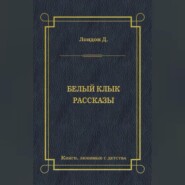По всем вопросам обращайтесь на: info@litportal.ru
(©) 2003-2024.
✖
Moon-Face, and Other Stories
Настройки чтения
Размер шрифта
Высота строк
Поля
“I had not got to the corner when I heard a familiar voice at my shoulder:
“‘Hello, Cinders! Which way?’
“It was Chi Slim, who had been with me once when I was thrown off a freight in Jacksonville. ‘Couldn’t see ‘em fer cinders,’ he described it, and the monica stuck by me… Monica? From monos. The tramp nickname.
“‘Bound south,’ I answered. ‘And how’s Slim?’
“‘Bum. Bulls is horstile.’
“‘Where’s the push?’
“‘At the hang-out. I’ll put you wise.’
“‘Who’s the main guy?’
“‘Me, and don’t yer ferget it.’”
The lingo was rippling from Leith’s lips, but perforce I stopped him. “Pray translate. Remember, I am a foreigner.”
“Certainly,” he answered cheerfully. “Slim is in poor luck. Bull means policeman. He tells me the bulls are hostile. I ask where the push is, the gang he travels with. By putting me wise he will direct me to where the gang is hanging out. The main guy is the leader. Slim claims that distinction.
“Slim and I hiked out to a neck of woods just beyond town, and there was the push, a score of husky hobos, charmingly located on the bank of a little purling stream.
“‘Come on, you mugs!’ Slim addressed them. ‘Throw yer feet! Here’s Cinders, an’ we must do ‘em proud.’
“All of which signifies that the hobos had better strike out and do some lively begging in order to get the wherewithal to celebrate my return to the fold after a year’s separation. But I flashed my dough and Slim sent several of the younger men off to buy the booze. Take my word for it, Anak, it was a blow-out memorable in Trampdom to this day. It’s amazing the quantity of booze thirty plunks will buy, and it is equally amazing the quantity of booze outside of which twenty stiffs will get. Beer and cheap wine made up the card, with alcohol thrown in for the blowd-in-the-glass stiffs. It was great – an orgy under the sky, a contest of beaker-men, a study in primitive beastliness. To me there is something fascinating in a drunken man, and were I a college president I should institute P.G. psychology courses in practical drunkenness. It would beat the books and compete with the laboratory.
“All of which is neither here nor there, for after sixteen hours of it, early next morning, the whole push was copped by an overwhelming array of constables and carted off to jail. After breakfast, about ten o’clock, we were lined upstairs into court, limp and spiritless, the twenty of us. And there, under his purple panoply, nose crooked like a Napoleonic eagle and eyes glittering and beady, sat Sol Glenhart.
“‘John Ambrose!’ the clerk called out, and Chi Slim, with the ease of long practice, stood up.
“‘Vagrant, your Honor,’ the bailiff volunteered, and his Honor, not deigning to look at the prisoner, snapped, ‘Ten days,’ and Chi Slim sat down.
“And so it went, with the monotony of clockwork, fifteen seconds to the man, four men to the minute, the mugs bobbing up and down in turn like marionettes. The clerk called the name, the bailiff the offence, the judge the sentence, and the man sat down. That was all. Simple, eh? Superb!
“Chi Slim nudged me. ‘Give’m a spiel, Cinders. You kin do it.’
“I shook my head.
“‘G’wan,’ he urged. ‘Give ‘m a ghost story The mugs’ll take it all right. And you kin throw yer feet fer tobacco for us till we get out.’
“‘L. C. Randolph!’ the clerk called.
“I stood up, but a hitch came in the proceedings. The clerk whispered to the judge, and the bailiff smiled.
“‘You are a newspaper man, I understand, Mr. Randolph?’ his Honor remarked sweetly.
“It took me by surprise, for I had forgotten the Cowbell in the excitement of succeeding events, and I now saw myself on the edge of the pit I had digged.
“‘That’s yer graft. Work it,’ Slim prompted.
“‘It’s all over but the shouting,’ I groaned back, but Slim, unaware of the article, was puzzled.
“‘Your Honor,’ I answered, ‘when I can get work, that is my occupation.’
“‘You take quite an interest in local affairs, I see.’ (Here his Honor took up the morning’s Cowbell and ran his eye up and down a column I knew was mine.) ‘Color is good,’ he commented, an appreciative twinkle in his eyes; ‘pictures excellent, characterized by broad, Sargent-like effects. Now this…t his judge you have depicted… you, ah, draw from life, I presume?’
“‘Rarely, your I Honor,’ I answered. ‘Composites, ideals, rather … er, types, I may say.’
“‘But you have color, sir, unmistakable color,’ he continued.
“‘That is splashed on afterward,’ I explained.
“‘This judge, then, is not modelled from life, as one might be led to believe?’
“‘No, your Honor.’
“‘Ah, I see, merely a type of judicial wickedness?’
“‘Nay, more, your Honor,’ I said boldly, ‘an ideal.’
“‘Splashed with local color afterward? Ha! Good! And may I venture to ask how much you received for this bit of work?’
“‘Thirty dollars, your Honor.’
“‘Hum, good!’ And his tone abruptly changed. ‘Young man, local color is a bad thing. I find you guilty of it and sentence you to thirty days’ imprisonment, or, at your pleasure, impose a fine of thirty dollars.’
“‘Alas!’ said I, ‘I spent the thirty dollars in riotous living.’
“‘And thirty days more for wasting your substance.’
“‘Next case!’ said his Honor to the clerk.
“Slim was stunned. ‘Gee!’ he whispered. ‘Gee the push gets ten days and you get sixty. Gee!’”
Leith struck a match, lighted his dead cigar, and opened the book on his knees. “Returning to the original conversation, don’t you find, Anak, that though Loria handles the bipartition of the revenues with scrupulous care, he yet omits one important factor, namely – ”
“Yes,” I said absently; “yes.”
AMATEUR NIGHT
The elevator boy smiled knowingly to himself. When he took her up, he had noted the sparkle in her eyes, the color in her cheeks. His little cage had quite warmed with the glow of her repressed eagerness. And now, on the down trip, it was glacier-like. The sparkle and the color were gone. She was frowning, and what little he could see of her eyes was cold and steel-gray. Oh, he knew the symptoms, he did. He was an observer, and he knew it, too, and some day, when he was big enough, he was going to be a reporter, sure. And in the meantime he studied the procession of life as it streamed up and down eighteen sky-scraper floors in his elevator car. He slid the door open for her sympathetically and watched her trip determinedly out into the street.
There was a robustness in her carriage which came of the soil rather than of the city pavement. But it was a robustness in a finer than the wonted sense, a vigorous daintiness, it might be called, which gave an impression of virility with none of the womanly left out. It told of a heredity of seekers and fighters, of people that worked stoutly with head and hand, of ghosts that reached down out of the misty past and moulded and made her to be a doer of things.
But she was a little angry, and a great deal hurt. “I can guess what you would tell me,” the editor had kindly but firmly interrupted her lengthy preamble in the long-looked-forward-to interview just ended. “And you have told me enough,” he had gone on (heartlessly, she was sure, as she went over the conversation in its freshness). “You have done no newspaper work. You are undrilled, undisciplined, unhammered into shape. You have received a high-school education, and possibly topped it off with normal school or college. You have stood well in English. Your friends have all told you how cleverly you write, and how beautifully, and so forth and so forth. You think you can do newspaper work, and you want me to put you on. Well, I am sorry, but there are no openings. If you knew how crowded – ”
“But if there are no openings,” she had interrupted, in turn, “how did those who are in, get in? How am I to show that I am eligible to get in?”
“‘Hello, Cinders! Which way?’
“It was Chi Slim, who had been with me once when I was thrown off a freight in Jacksonville. ‘Couldn’t see ‘em fer cinders,’ he described it, and the monica stuck by me… Monica? From monos. The tramp nickname.
“‘Bound south,’ I answered. ‘And how’s Slim?’
“‘Bum. Bulls is horstile.’
“‘Where’s the push?’
“‘At the hang-out. I’ll put you wise.’
“‘Who’s the main guy?’
“‘Me, and don’t yer ferget it.’”
The lingo was rippling from Leith’s lips, but perforce I stopped him. “Pray translate. Remember, I am a foreigner.”
“Certainly,” he answered cheerfully. “Slim is in poor luck. Bull means policeman. He tells me the bulls are hostile. I ask where the push is, the gang he travels with. By putting me wise he will direct me to where the gang is hanging out. The main guy is the leader. Slim claims that distinction.
“Slim and I hiked out to a neck of woods just beyond town, and there was the push, a score of husky hobos, charmingly located on the bank of a little purling stream.
“‘Come on, you mugs!’ Slim addressed them. ‘Throw yer feet! Here’s Cinders, an’ we must do ‘em proud.’
“All of which signifies that the hobos had better strike out and do some lively begging in order to get the wherewithal to celebrate my return to the fold after a year’s separation. But I flashed my dough and Slim sent several of the younger men off to buy the booze. Take my word for it, Anak, it was a blow-out memorable in Trampdom to this day. It’s amazing the quantity of booze thirty plunks will buy, and it is equally amazing the quantity of booze outside of which twenty stiffs will get. Beer and cheap wine made up the card, with alcohol thrown in for the blowd-in-the-glass stiffs. It was great – an orgy under the sky, a contest of beaker-men, a study in primitive beastliness. To me there is something fascinating in a drunken man, and were I a college president I should institute P.G. psychology courses in practical drunkenness. It would beat the books and compete with the laboratory.
“All of which is neither here nor there, for after sixteen hours of it, early next morning, the whole push was copped by an overwhelming array of constables and carted off to jail. After breakfast, about ten o’clock, we were lined upstairs into court, limp and spiritless, the twenty of us. And there, under his purple panoply, nose crooked like a Napoleonic eagle and eyes glittering and beady, sat Sol Glenhart.
“‘John Ambrose!’ the clerk called out, and Chi Slim, with the ease of long practice, stood up.
“‘Vagrant, your Honor,’ the bailiff volunteered, and his Honor, not deigning to look at the prisoner, snapped, ‘Ten days,’ and Chi Slim sat down.
“And so it went, with the monotony of clockwork, fifteen seconds to the man, four men to the minute, the mugs bobbing up and down in turn like marionettes. The clerk called the name, the bailiff the offence, the judge the sentence, and the man sat down. That was all. Simple, eh? Superb!
“Chi Slim nudged me. ‘Give’m a spiel, Cinders. You kin do it.’
“I shook my head.
“‘G’wan,’ he urged. ‘Give ‘m a ghost story The mugs’ll take it all right. And you kin throw yer feet fer tobacco for us till we get out.’
“‘L. C. Randolph!’ the clerk called.
“I stood up, but a hitch came in the proceedings. The clerk whispered to the judge, and the bailiff smiled.
“‘You are a newspaper man, I understand, Mr. Randolph?’ his Honor remarked sweetly.
“It took me by surprise, for I had forgotten the Cowbell in the excitement of succeeding events, and I now saw myself on the edge of the pit I had digged.
“‘That’s yer graft. Work it,’ Slim prompted.
“‘It’s all over but the shouting,’ I groaned back, but Slim, unaware of the article, was puzzled.
“‘Your Honor,’ I answered, ‘when I can get work, that is my occupation.’
“‘You take quite an interest in local affairs, I see.’ (Here his Honor took up the morning’s Cowbell and ran his eye up and down a column I knew was mine.) ‘Color is good,’ he commented, an appreciative twinkle in his eyes; ‘pictures excellent, characterized by broad, Sargent-like effects. Now this…t his judge you have depicted… you, ah, draw from life, I presume?’
“‘Rarely, your I Honor,’ I answered. ‘Composites, ideals, rather … er, types, I may say.’
“‘But you have color, sir, unmistakable color,’ he continued.
“‘That is splashed on afterward,’ I explained.
“‘This judge, then, is not modelled from life, as one might be led to believe?’
“‘No, your Honor.’
“‘Ah, I see, merely a type of judicial wickedness?’
“‘Nay, more, your Honor,’ I said boldly, ‘an ideal.’
“‘Splashed with local color afterward? Ha! Good! And may I venture to ask how much you received for this bit of work?’
“‘Thirty dollars, your Honor.’
“‘Hum, good!’ And his tone abruptly changed. ‘Young man, local color is a bad thing. I find you guilty of it and sentence you to thirty days’ imprisonment, or, at your pleasure, impose a fine of thirty dollars.’
“‘Alas!’ said I, ‘I spent the thirty dollars in riotous living.’
“‘And thirty days more for wasting your substance.’
“‘Next case!’ said his Honor to the clerk.
“Slim was stunned. ‘Gee!’ he whispered. ‘Gee the push gets ten days and you get sixty. Gee!’”
Leith struck a match, lighted his dead cigar, and opened the book on his knees. “Returning to the original conversation, don’t you find, Anak, that though Loria handles the bipartition of the revenues with scrupulous care, he yet omits one important factor, namely – ”
“Yes,” I said absently; “yes.”
AMATEUR NIGHT
The elevator boy smiled knowingly to himself. When he took her up, he had noted the sparkle in her eyes, the color in her cheeks. His little cage had quite warmed with the glow of her repressed eagerness. And now, on the down trip, it was glacier-like. The sparkle and the color were gone. She was frowning, and what little he could see of her eyes was cold and steel-gray. Oh, he knew the symptoms, he did. He was an observer, and he knew it, too, and some day, when he was big enough, he was going to be a reporter, sure. And in the meantime he studied the procession of life as it streamed up and down eighteen sky-scraper floors in his elevator car. He slid the door open for her sympathetically and watched her trip determinedly out into the street.
There was a robustness in her carriage which came of the soil rather than of the city pavement. But it was a robustness in a finer than the wonted sense, a vigorous daintiness, it might be called, which gave an impression of virility with none of the womanly left out. It told of a heredity of seekers and fighters, of people that worked stoutly with head and hand, of ghosts that reached down out of the misty past and moulded and made her to be a doer of things.
But she was a little angry, and a great deal hurt. “I can guess what you would tell me,” the editor had kindly but firmly interrupted her lengthy preamble in the long-looked-forward-to interview just ended. “And you have told me enough,” he had gone on (heartlessly, she was sure, as she went over the conversation in its freshness). “You have done no newspaper work. You are undrilled, undisciplined, unhammered into shape. You have received a high-school education, and possibly topped it off with normal school or college. You have stood well in English. Your friends have all told you how cleverly you write, and how beautifully, and so forth and so forth. You think you can do newspaper work, and you want me to put you on. Well, I am sorry, but there are no openings. If you knew how crowded – ”
“But if there are no openings,” she had interrupted, in turn, “how did those who are in, get in? How am I to show that I am eligible to get in?”

















